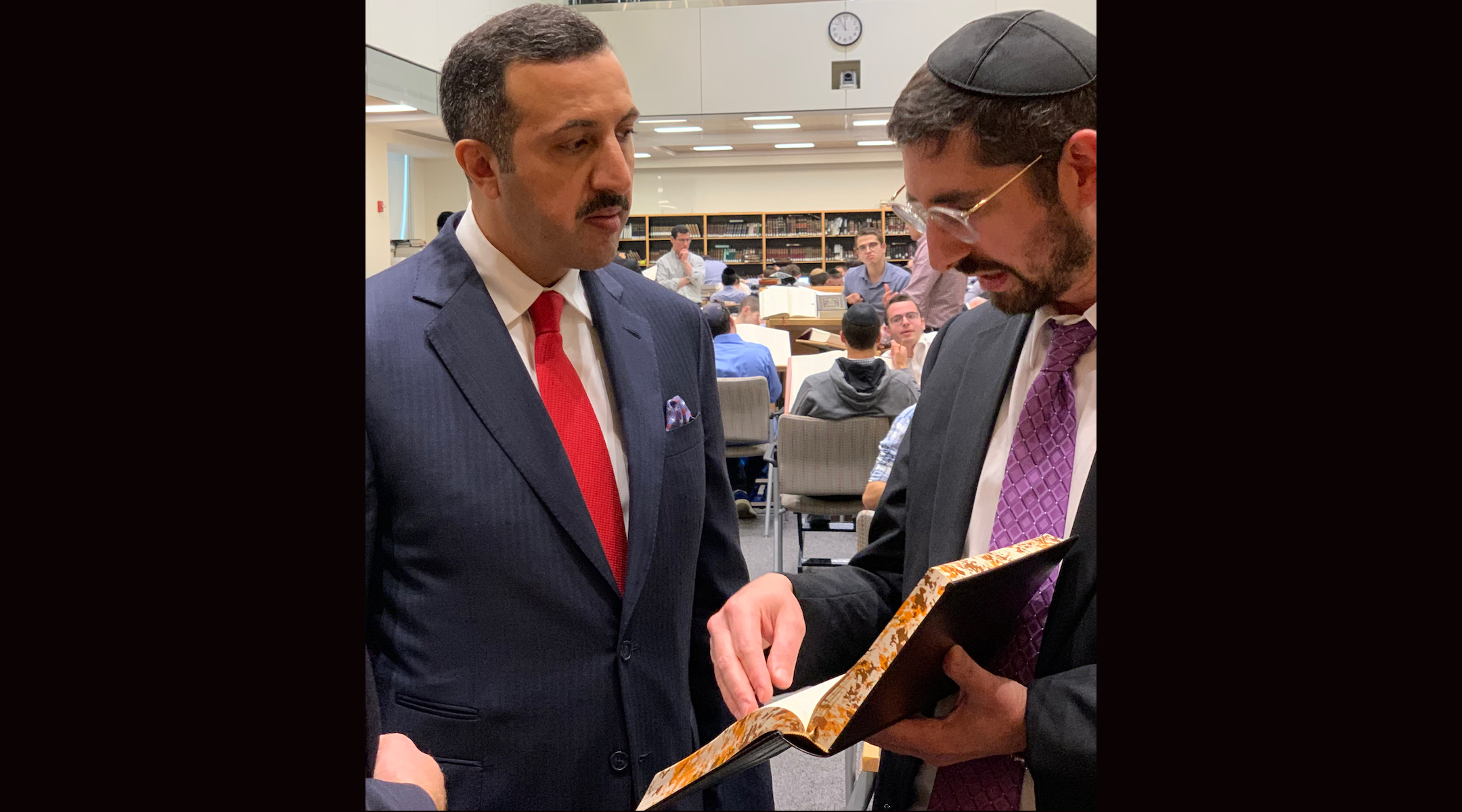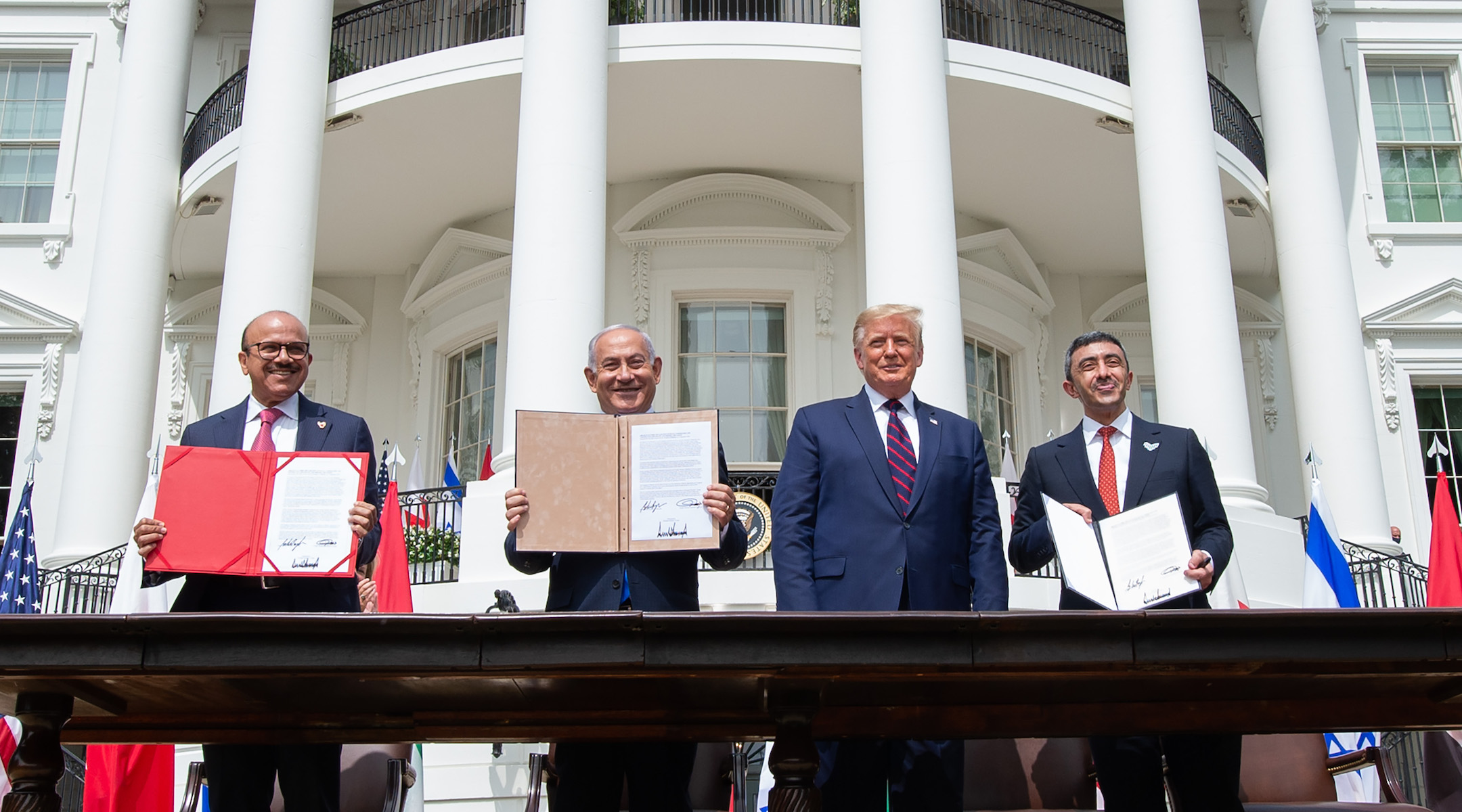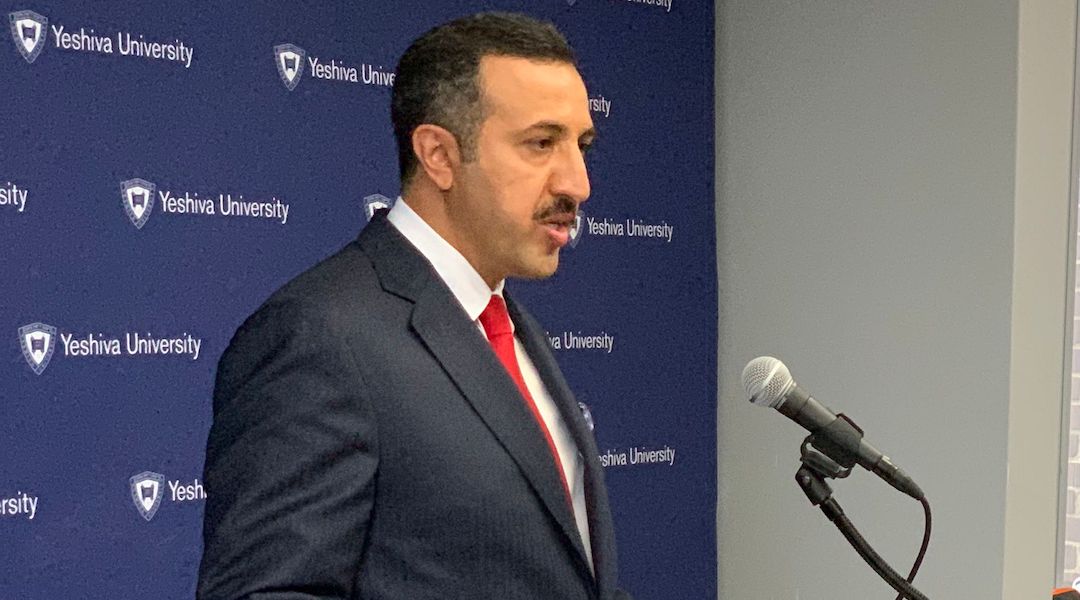NEW YORK (JTA) — Sitting in front of a group of rabbis in New York City, the undersecretary for political affairs at the Kingdom of Bahrain’s Foreign Ministry explained that he first learned his country would be signing a diplomatic treaty with Israel on a Saturday.
Except he didn’t say “Saturday.” He said “Shabbat.”
Likewise, the undersecretary, Shaikh Abdulla bin Ahmed Al Khalifa, told a story to the group about encouraging an Israeli official to wear his kippah at a conference in Manama, Bahrain’s capital, last year. And he chuckled about going diving this year with the director-general of Israel’s Foreign Ministry in an Israeli town close to the Lebanese border, just miles away from territory controlled by the terror group Hezbollah.
It was all part of a two-day trip meant to meet, connect with and charm leaders of the American Jewish community in New York City. The trip came against the backdrop of Bahrain’s normalization agreement last year with Israel, called the Abraham Accords, which also established full relations between Israel and the United Arab Emirates.
Al Khalifa also made a direct pitch to American Jews: He wants them to invest money in Bahrain and travel to the country as tourists. In addition — following criticism of Bahrain’s human rights record and authoritarian government — he wants American Jews to spread the message of, in his words, “the values of coexistence and acceptance and tolerance that Bahrain has been upholding for so long.”
“Every one of you has influence over your Jewish communities — encouraging them to visit Bahrain, encouraging them to have investments in Bahrain, to get to know Bahrain,” he told the rabbis.
“When the Abraham Accords were signed, all of a sudden, there was a spike in the attacks against Bahrain, mainly in the human rights arenas, from European institutions who for some reason believed that they are responsible for the wellbeing of Bahrainis. So focusing on that would very much support Bahrain.”
Al Khalifa began his trip on Monday by speaking with leaders of New York’s UJA-Federation. He then met the rabbis, and afterward headed to Yeshiva University to meet students and faculty. Later on Monday, he was scheduled to meet privately with former Israeli Prime Minister Ehud Barak, who was in New York.
The next day, he met with the Conference of Presidents of Major American Jewish Organizations and with a group his aide described as Jewish business leaders.
“The main vision was to build bridges of peace and prosperity not only with Israel and Bahrain but also with the Jewish community,” he said in an interview Monday with the Jewish Telegraphic Agency. “This is a warm peace. It’s not only between leaders, government to government, but it’s also between the people.”
When Bahrain and the UAE signed the Abraham Accords last year on the White House lawn, it was a landmark shift for the region — the first time Israel had signed a major diplomatic agreement with an Arab country in 25 years. Two more countries, Morocco and Sudan, are also in the process of establishing official ties with Israel.
In the past year, both Israel and the United States have elected new leaders, but normalization is proceeding apace. Days before Al Khalifa’s visit, Israeli Foreign Minister Yair Lapid visited the kingdom and opened Israel’s embassy there. The Biden Administration has also affirmed its commitment to the accords. Bahrain’s first-ever commercial flight to Tel Aviv landed last week.
Al Khalifa and a Jewish special adviser to the king, Rabbi Marc Schneier, both said to the rabbis that they want to encourage Jewish investment in Bahrain. In the meeting with the rabbis, Schneier touted direct routes to Israel and New York City launched by Bahrain’s national airline, Gulf Air. Synagogue missions to Israel, he said, could first make a stop in Bahrain before heading to Tel Aviv.
“The American Jewish community can contribute to Bahrain economically,” Schneier, the founding rabbi of the Hampton Synagogue in New York, told JTA in an interview. “Tourism is a very, very important source of revenue for Bahrain, and the grand prize is not Israeli tourists, it’s American Jewish tourists.”
He added, “No one really thought about, ever, visiting the Gulf, and I think there is a great opportunity where the American Jewish community can make that contribution from an intercultural, interreligious, and also from an economic point of view.”

Shaikh Abdulla bin Ahmed Al Khalifa meets with Rabbi Yosef Kalinsky, a Yeshiva University dean, at the university on Monday, Oct. 4, 2021. (Courtesy of the Reut Group)
Al Khalifa said Bahrain was open to people of all backgrounds. He noted that the country has had a Jewish community for well over a century, including a synagogue in Manama, and that Jews enjoy designated representation in Bahrain’s Shura Council, a legislative body appointed by the king. He also listed several actions the king has taken in the name of protecting human rights, such as placing an ombudsman at the country’s Interior Ministry and establishing a commission to track the rights of prisoners and detainees.
Human rights watchdogs, however, say that such institutions have done little to ameliorate the country’s authoritarian system, in which the king controls all branches of the government and there is no free press. The situation has gotten worse, they said, in the decade since the government quashed protests during the Arab Spring in 2011. Amnesty International said human rights mechanisms in the country “remained ineffective in safeguarding human rights and punishing violations.”
In a report last year, Freedom House called Bahrain “one of the Middle East’s more repressive states,” which “has systematically eliminated a broad range of political rights and civil liberties, dismantled the political opposition, and cracked down harshly on persistent dissent concentrated among the Shiite population.”
Al Khalifa called the country’s human rights protections “second to none in the region.” But he also said there should be boundaries on free speech.
“When we say freedom of expression, it’s protected by the [Bahraini] constitution,” he told JTA. “But there’s a limit to your freedom of expression when your expression would interfere with or would affect national security or would instigate hatred or sectarianism.”
The rabbis received Al Khalifa warmly and took a group photo with him, asking how they can learn more about Bahrain, which countries may be next to establish ties with Israel and how the Abraham Accords relate to the Israeli-Palestinian conflict.
“When an Arab country makes peace, not just any peace, but a warm peace with Israel, the American Jewish community becomes your home,” said Rabbi Yehuda Sarna, honorary chairman of the Association of Gulf Jewish Communities and a chaplain at New York University. “There are very few things more popular with American Jews than Arabs and Israelis making peace.”
Rabbi Rachel Ain said she appreciated the opportunity to connect across cultures and learn about Bahrain. She said she’d be amenable to taking her congregants there once international travel resumes.
“When we only speak to ourselves, whether that’s politically or each government, or our own ideology, then we’re going to miss the nuance of what can actually be created,” said Ain, rabbi of the Sutton Place Synagogue in New York. “Conversations like this morning show us that the tapestry of the world is much better when diverse voices are brought together.”
Rabbi Bini Krauss, principal of the Modern Orthodox SAR Academy, likewise said he looked forward to learning more about Bahrain before he would advocate for or publicly criticize it. He said, “I didn’t come out of this meeting feeling like I’m an ambassador of Bahrain.” He added, “There’s a lot to learn.”

From left, Bahrain Foreign Minister Abdullatif al-Zayani, Israeli Prime Minister Benjamin Netanyahu, President Donald Trump and UAE Foreign Minister Abdullah bin Zayed Al Nahyan at the signing of the Abraham Accords at the White House, Sept. 15, 2020. (Saul Loeb/AFP via Getty Images)
The normalization agreements signaled a realignment in the Middle East, in which Israel is becoming an open partner of nations that it once dealt with only clandestinely. Before the Abraham Accords, nearly all Arab countries had said they would normalize relations with Israel only after the end of Israel’s occupation of the West Bank. Palestinian leadership called the agreements a “stab in the back.”
But Al Khalifa said the treaty with Israel did not preclude supporting core Palestinian demands, including an independent state with its capital in East Jerusalem. He added that having relations with Israel could allow Bahrain to play a part in mediating future conflicts in Gaza. Egypt and Jordan, which both signed peace treaties with Israel decades ago, have filled that role in past conflicts.
“Look at what happened in Gaza recently,” he told the rabbis, referring to the conflict in May between Israel and Hamas. “Who was able to ease the tensions? It was Egypt and Jordan. Bahrain is very well respected in the region and globally. His Majesty, personally, his leadership — the Palestinians respect him a lot.”
Al Khalifa also said that Israel and Bahrain were both on the same page vis-à-vis the threat posed by Iran, and could begin cooperating on security matters. On a recent visit to Israel, Al Khalifa met with a senior official from the Israel Defense Forces. Khalifa was careful to note, however, that the Abraham Accords were “not intended against a certain country.”
Both countries have expressed uneasiness about the US reentering the Iran nuclear agreement, a process the Biden administration is currently negotiating following former President Donald Trump’s withdrawal from the deal. Al Khalifa wants the Iran deal, known by the acronym JCPOA, to also limit Iranian support for regional terror groups. He praised Trump’s sanctions on Iran, which Trump referred to as “maximum pressure.”
“We have seen how the maximum pressure campaign has had its effect,” he told JTA. “Having the JCPOA is better than not having a JCPOA, but having a JCPOA that would address the concerns of the region and not only focus on one aspect of the nuclear program, but cover the other aspects, is very important.”
But despite his title, Al Khalifa wasn’t in New York City this week primarily to talk policy. Instead, he wanted to begin a relationship between American Jews and his kingdom — and to convince them to visit.
“There are certain perceptions about Bahrain in certain fields that do not reflect the reality on the ground,” he told JTA. “But seeing is believing.”
The New York Jewish Week brings you the stories behind the headlines, keeping you connected to Jewish life in New York. Help sustain the reporting you trust by donating today.





